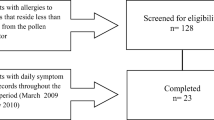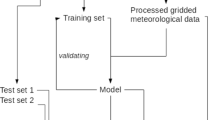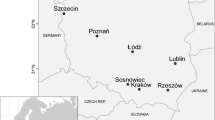Abstract
The aim of this study was to build up a picture of the influence of meteorological conditions on pollen and pollinosis, taking account of weather types, pollen concentrations in the air and pollinosis symptoms, with the aim of preventing allergic responses. The study took place in Burgundy from 1996 to 1998, during the pollination of the birch (Betula), which is the most important arborean allergen in this region. We used daily pollen data from four Hirst volumetric traps, identified weather types by Bénichou’s classification, and obtained data on the occurrence of rhinitis, conjunctivitis, asthma and coughing from a sample of 100 patients. These data were analysed by multiple-component analysis. The results show that pollen dispersal is favoured by windy conditions, low relative humidity, precipitation below 2 mm and temperatures above 6°C. Such weather also favours pollinosis, but other particular meteorological situations, even if they do not assist pollen dispersal, can act directly on the development of symptoms: a decrease of temperature (3°C) led to the development of rhinitis and conjunctivitis, while strong winds were associated with many cases of conjunctivitis and asthma, owing to the irritant effect of cold or wind; asthma was favoured by temperature inversions with fog, probably because such weather corresponds to high levels of pollution, which act on bronchial hyperreactivity. Because the weather types favouring pollination and pollinosis are predicted by the meteorological office, this can constitute a tool for reducing the effect of high-risk allergenic days.
Similar content being viewed by others
Author information
Authors and Affiliations
Additional information
Received: 12 December 2000 / Revised: 24 April 2001 / Accepted: 9 May 2001
Rights and permissions
About this article
Cite this article
Laaidi, K. Predicting days of high allergenic risk during Betula pollination using weather types. Int J Biometeorol 45, 124–132 (2001). https://doi.org/10.1007/s004840100096
Issue Date:
DOI: https://doi.org/10.1007/s004840100096




